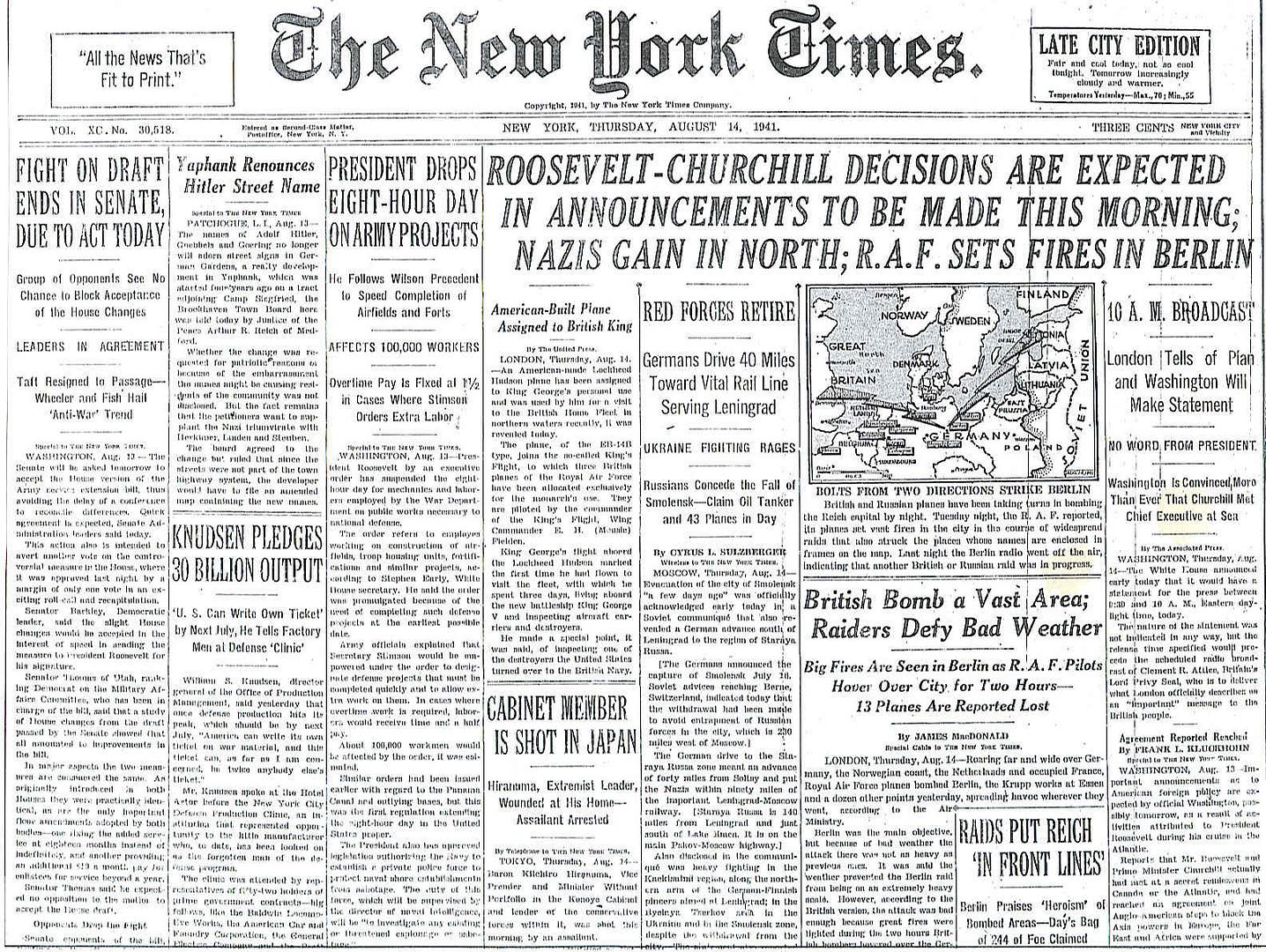
Posted on 08/14/2011 4:55:27 AM PDT by Homer_J_Simpson

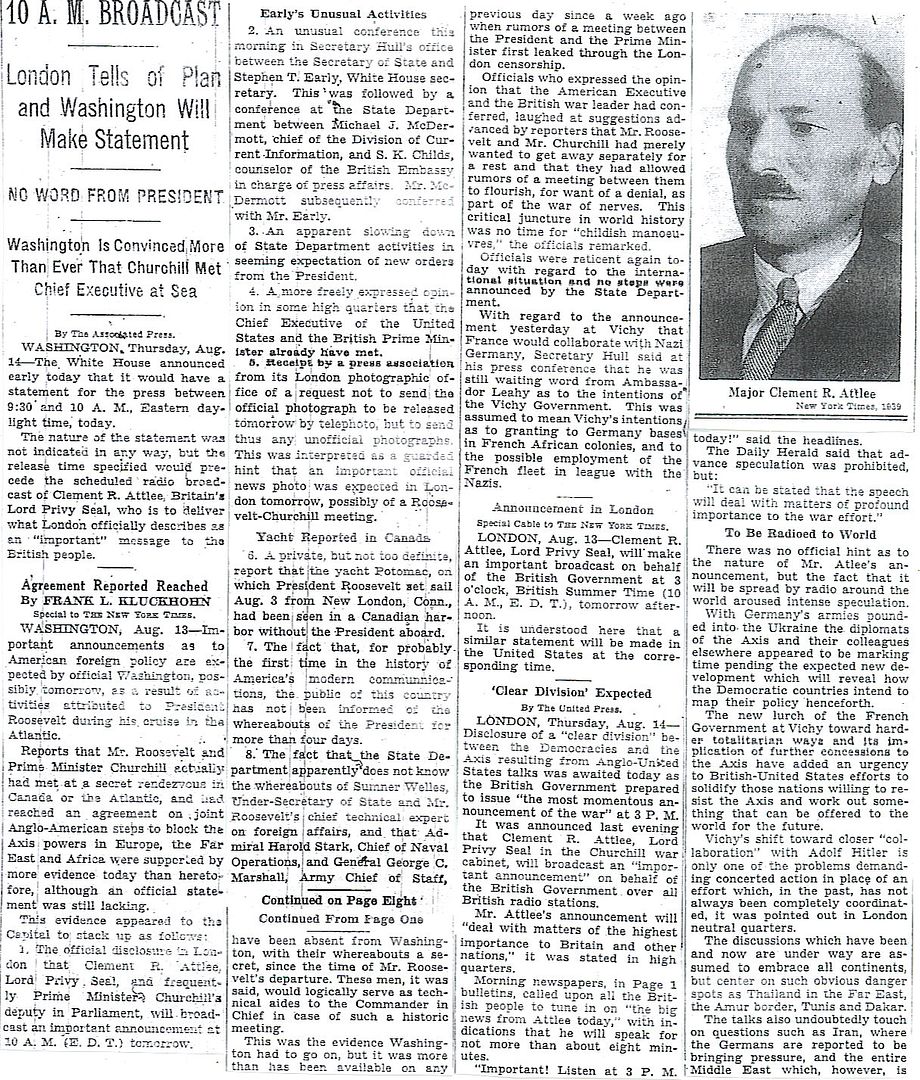
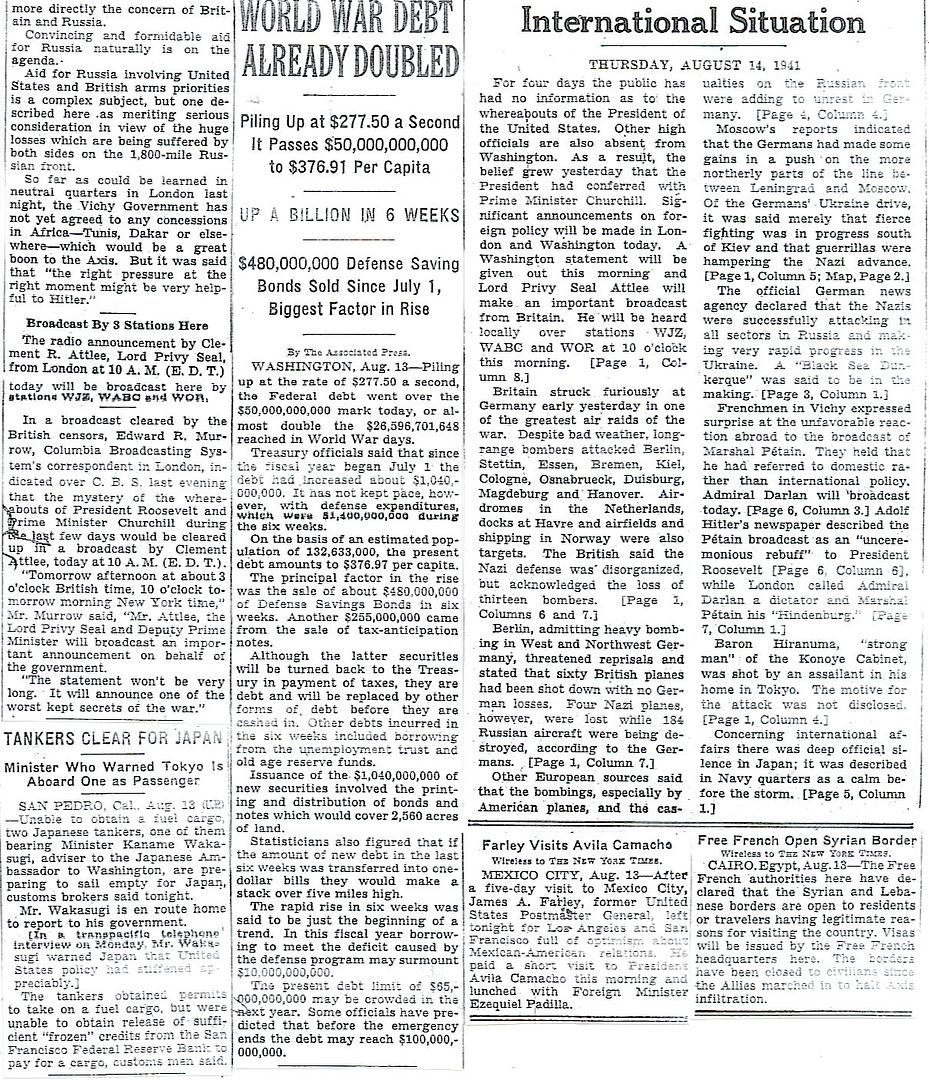
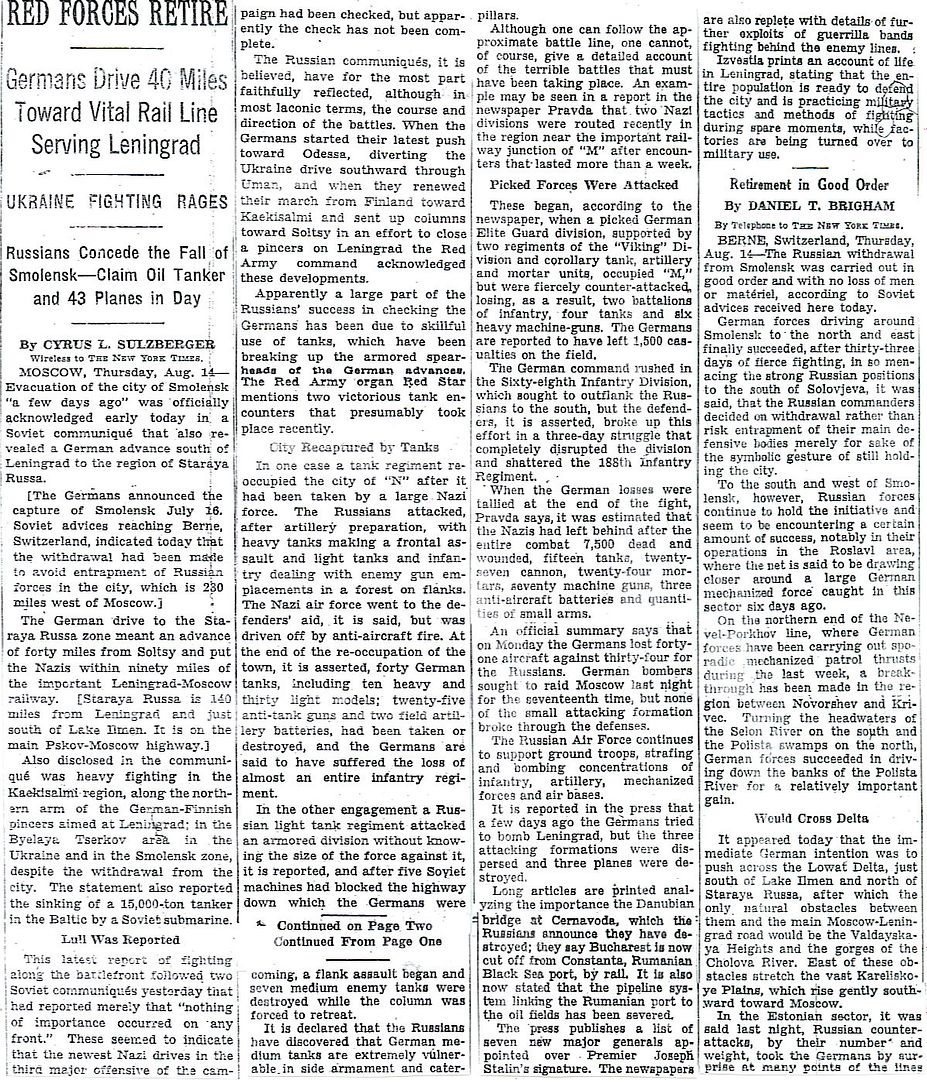
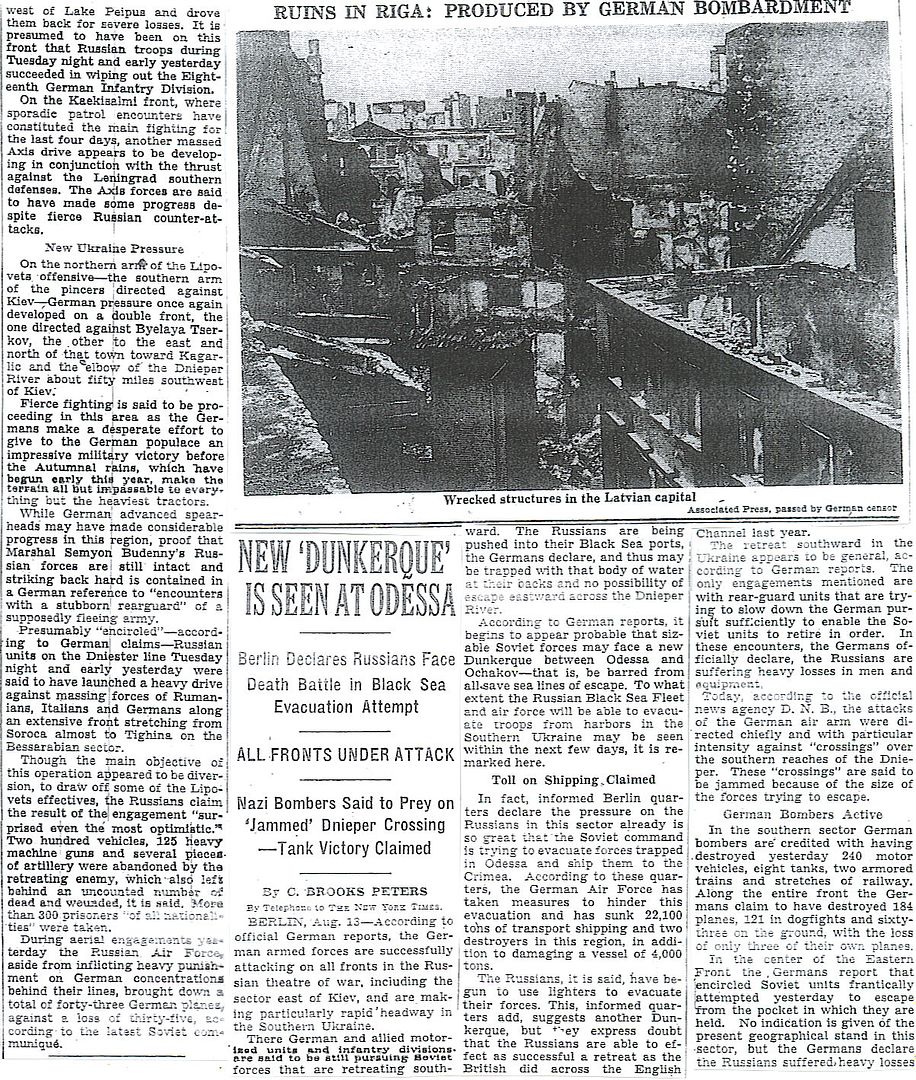
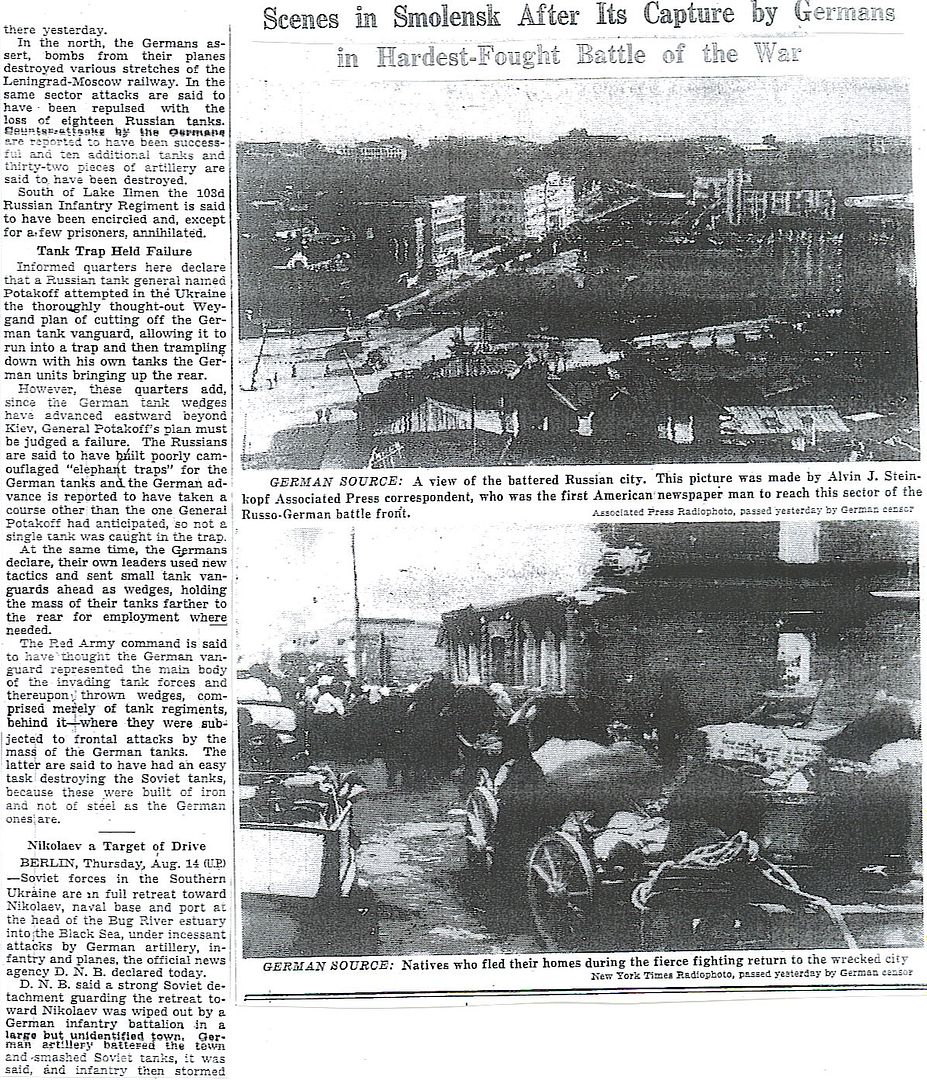
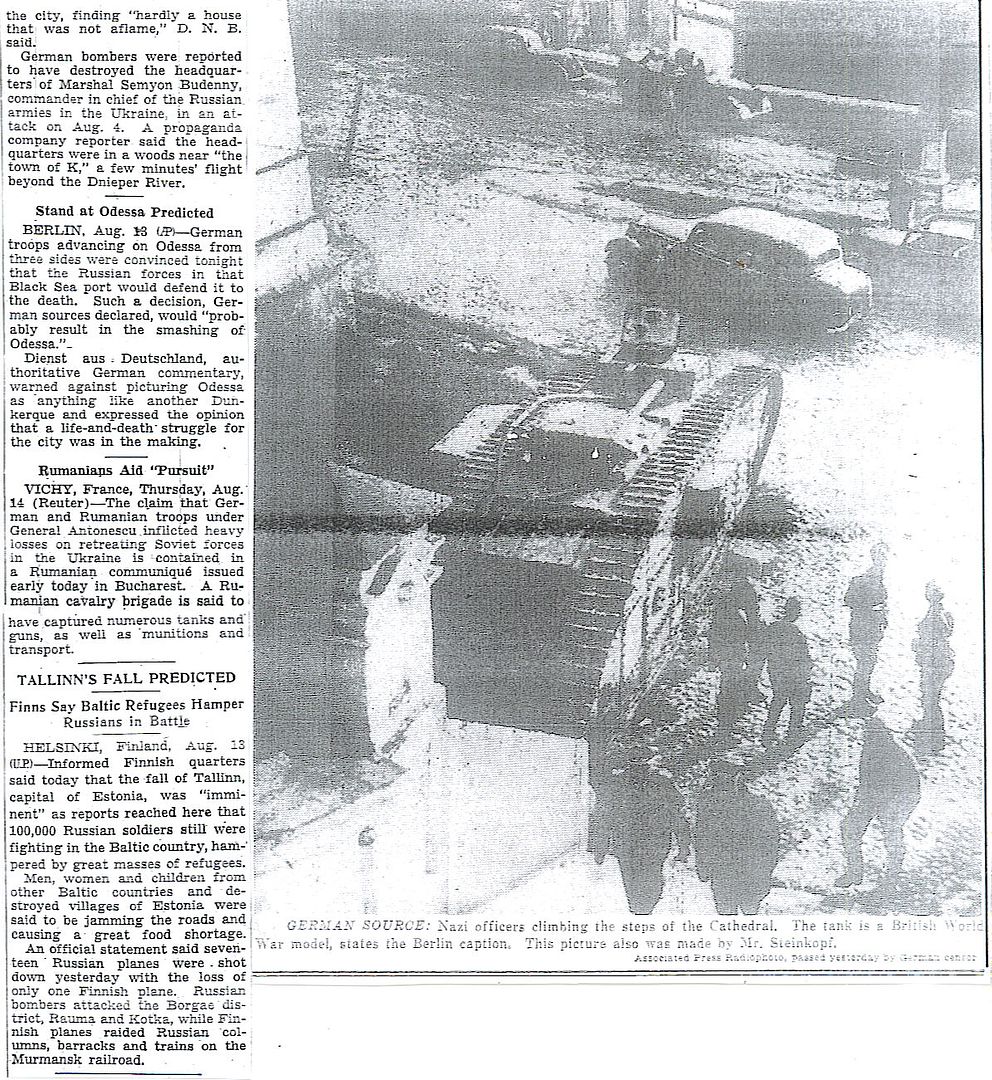
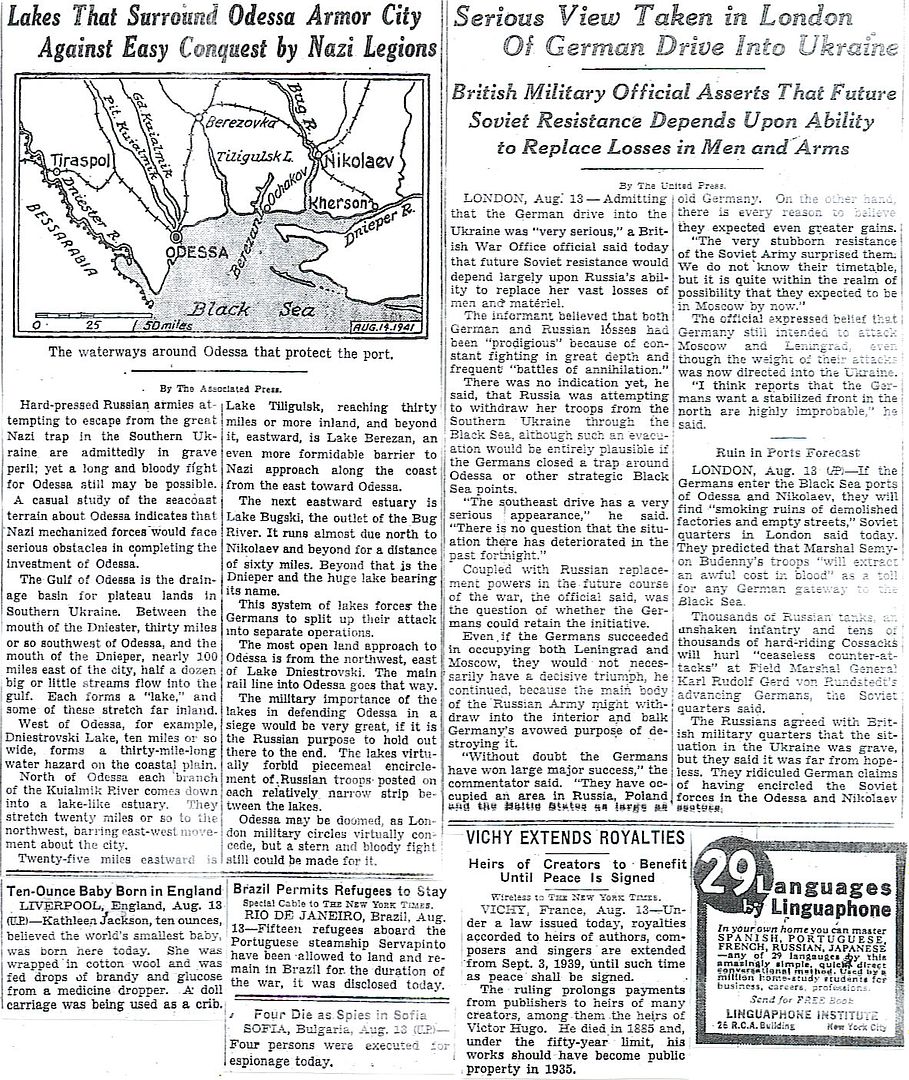
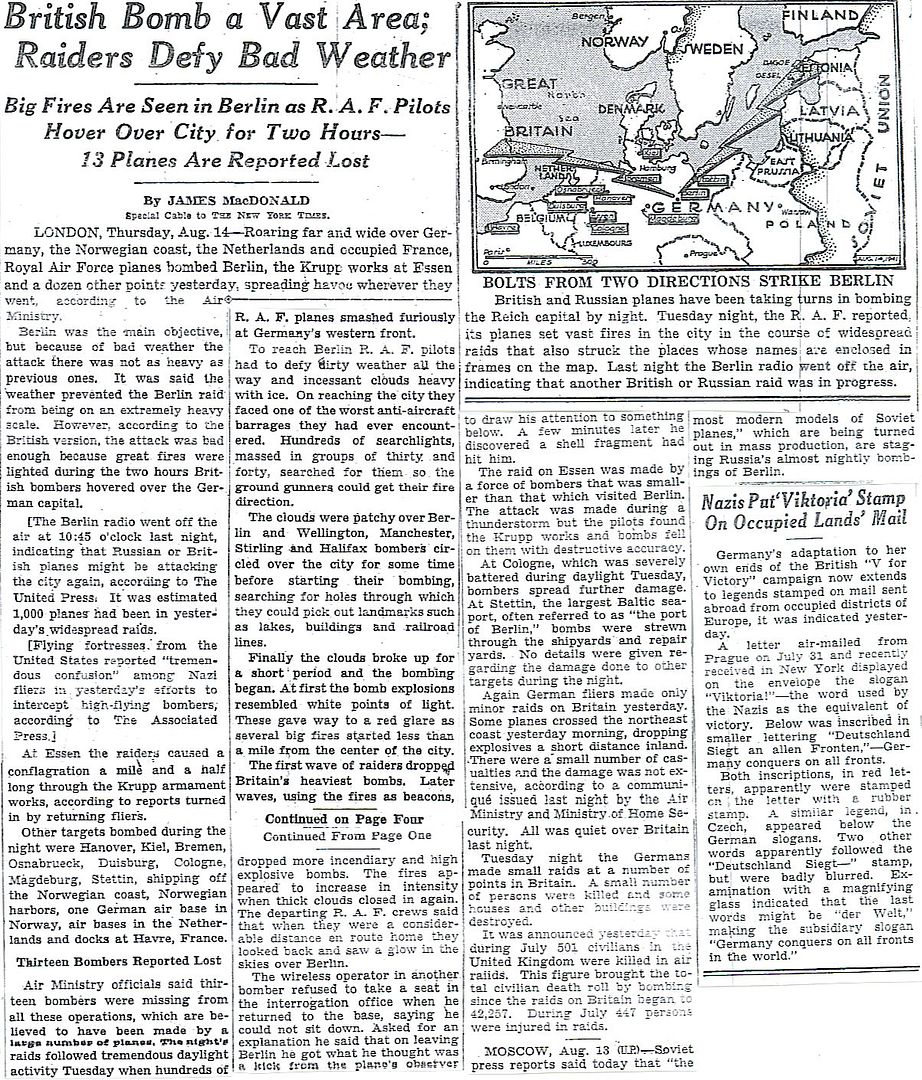
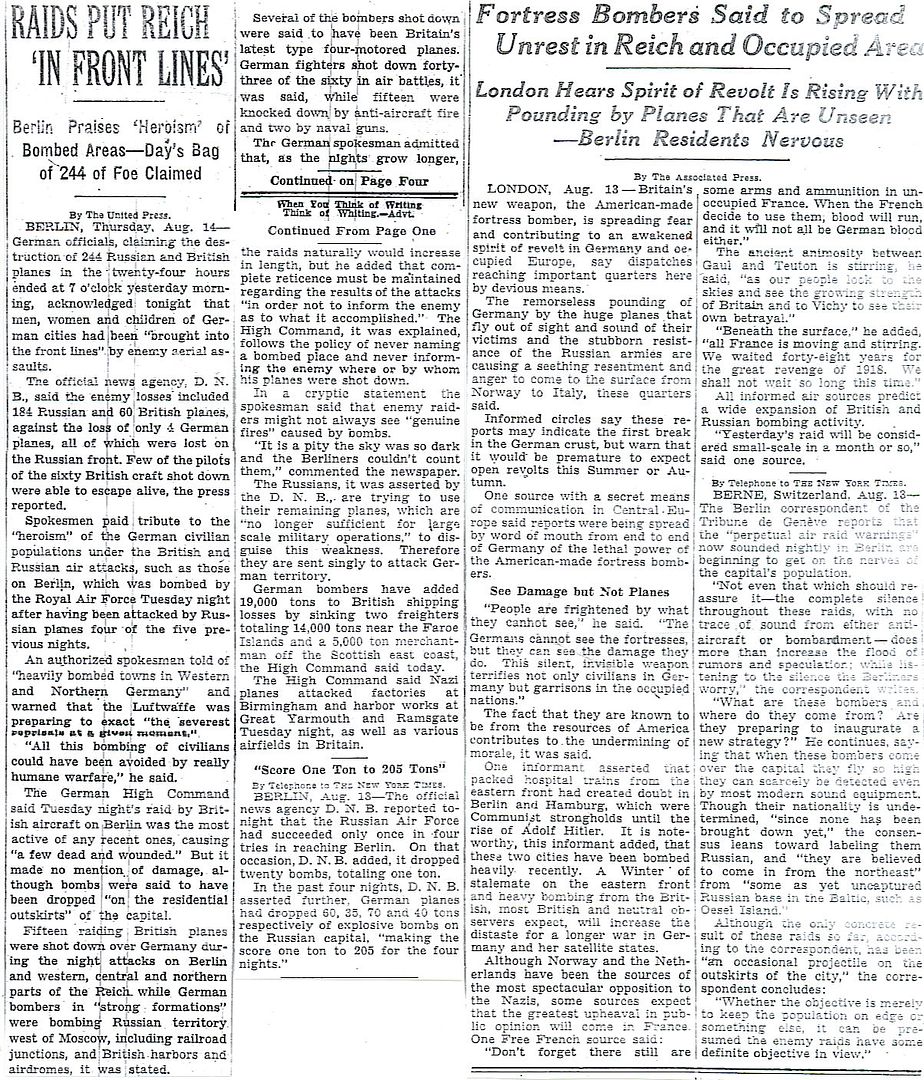
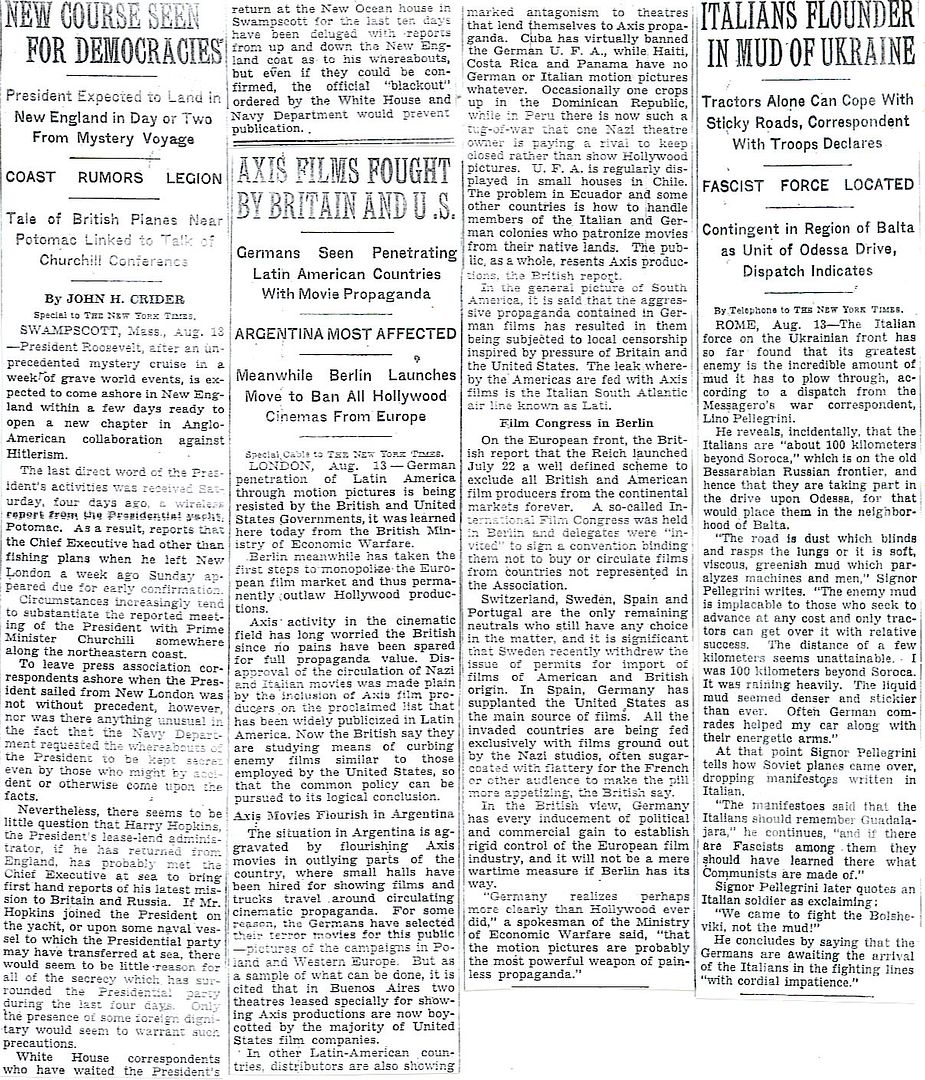
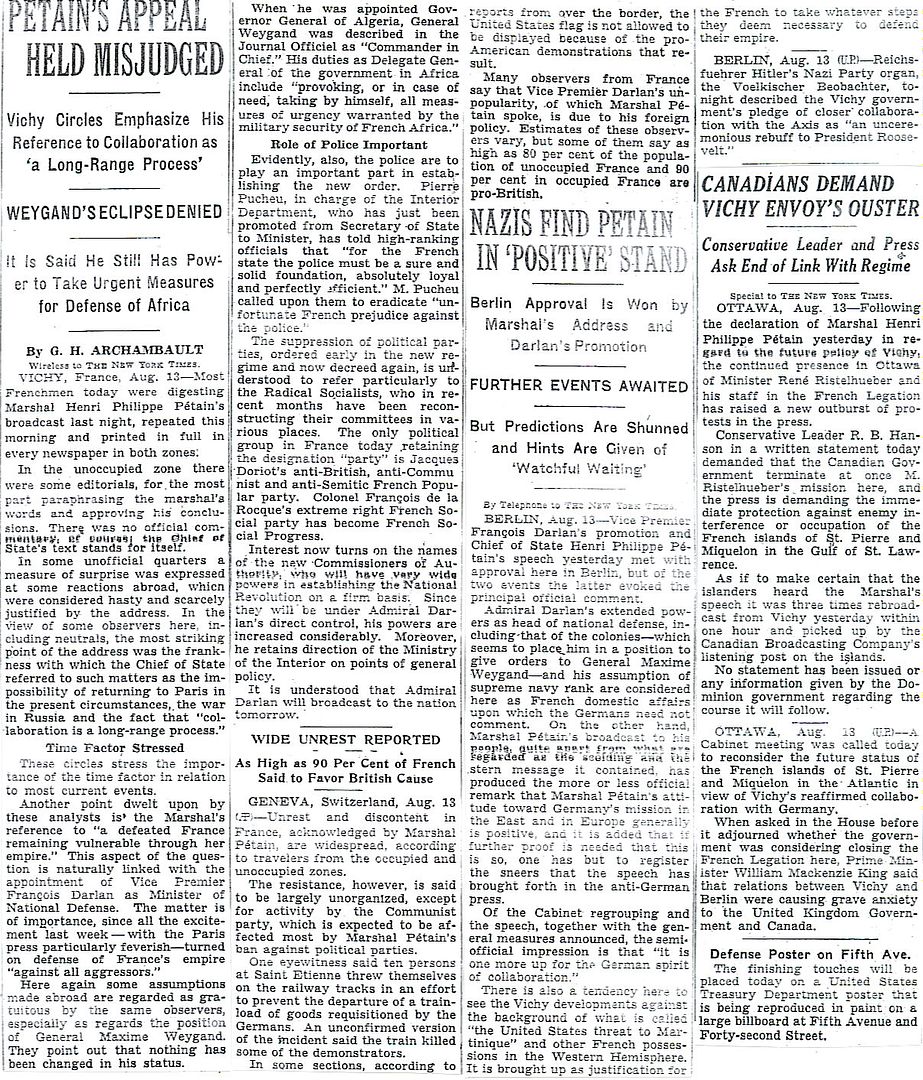
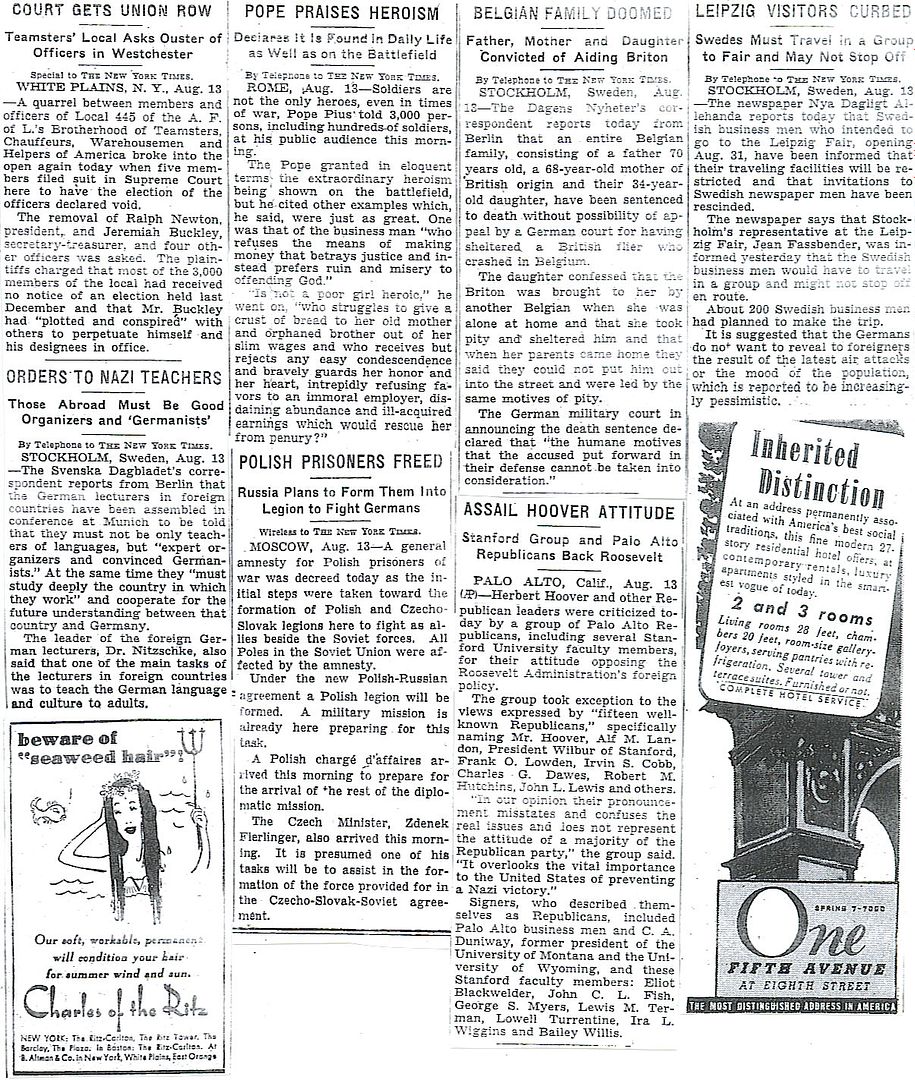
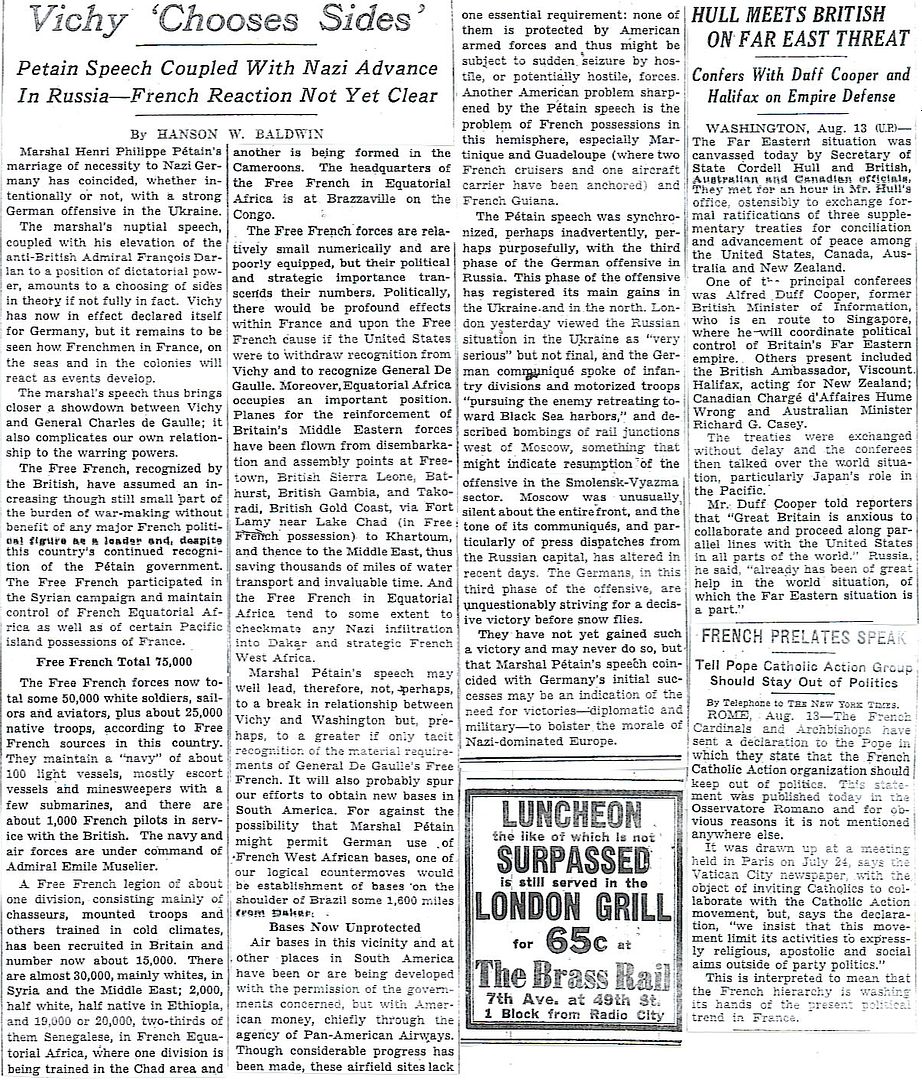
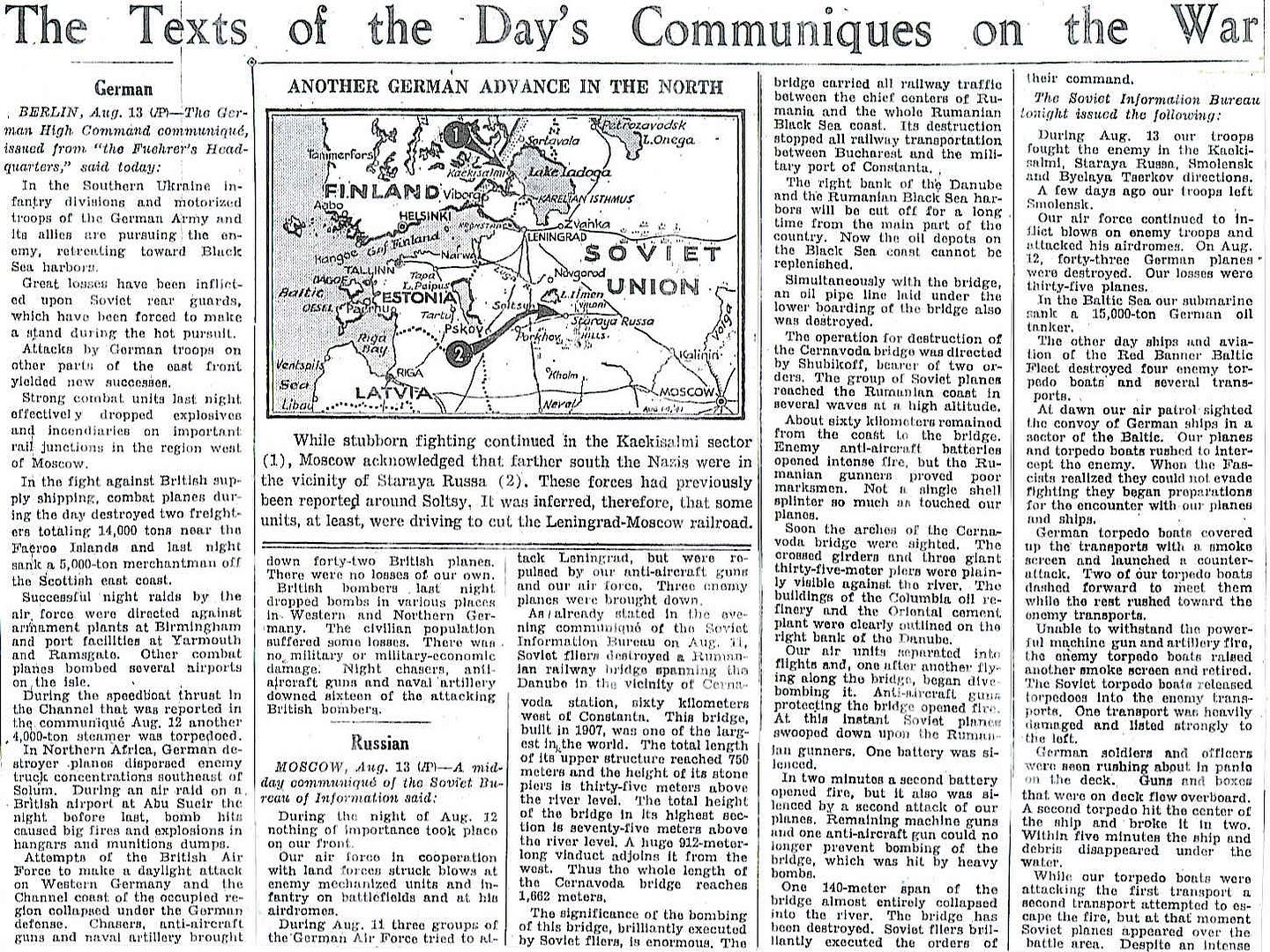
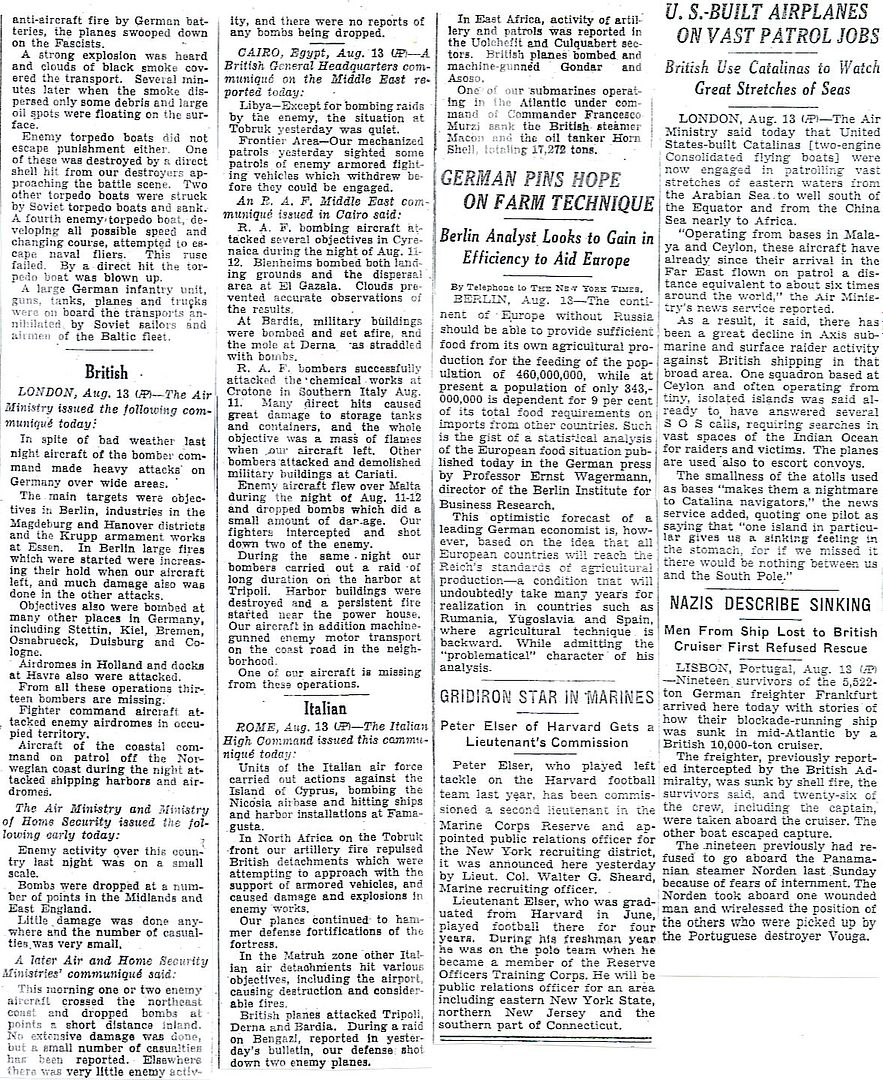
10 A. M. Broadcast – 2-3
World War Debt Already Doubled – 3
The International Situation – 3
Red Forces Retire – 4-5
Ruins in Riga: Produced by German Bombardment (photo) – 5
New ‘Dunkerque’ is Seen at Odessa – 5-7
Scenes in Smolensk after Its Capture by Germans in Hardest-Fought Battle of the War (photos) – 6-7
Lakes that Surround Odessa Armor City against Easy Conquest by Nazi Legions – 8
Serious View Taken in London of German Drive into Ukraine – 8
British Bomb a Vast Area; Raiders Defy Bad Weather – 9
Nazis Put ‘Viktoria’ Stamp on Occupied Lands’ Mail – 9
Raids Put Reich ‘In Front Lines’ – 10
Fortress Bombers Said to Spread Unrest in Reich and Occupied Areas – 10
New Course Seen for Democracies (by John H. Crider) – 11
Axis Films Fought by Britain and U.S. – 11
Italians Flounder in Mud of Ukraine – 11
Petain’s Appeal Held Misjudged (by G.H. Archambault) – 12
Nazis Find Petain in ‘Positive’ Stand – 12
Canadians Demand Vichy Envoy’s Ouster – 12
Vichy ‘Chooses Sides’ (by Hanson W. Baldwin) – 14
Hull Meets British on Far East Threat – 14
The Texts of the Day’s Communiques on the War – 15-16
German Pins Hope on Farm Technique – 16
U.S.-Build Airplanes on Vast Patrol Jobs – 16
http://www.onwar.com/chrono/1941/aug41/f14aug41.htm
Soviet evacuate Black Sea naval base
Thursday, August 14, 1941 www.onwar.com
On the Eastern Front... The Soviets begin to evacuate their Black Sea naval base at Nikolayev. Eight destroyers of the Black Sea fleet cover the operation (lasting through August 17th). Of the ships under construction in the port, 13 are far enough advanced to be towed away but one battleship and 10 other vessels on the stocks are blown up.
http://homepage.ntlworld.com/andrew.etherington/month/thismonth/14.htm
August 14th, 1941
UNITED KINGDOM: London: The German Josef Jakobs is executed by firing squad at the Tower of London.
Destroyer HMS Serapis (later transferred to the Royal Netherlands Navy as the Piet Hein) is laid down. (Dave Shirlaw)
GERMANY: U-252 is launched. U-583 is commissioned. (Dave Shirlaw)
POLAND: Auschwitz. Ten Polish prisoners had been condemned to die after a prisoner had escaped. When the ten were selected, one begged and pleaded to be saved for his wife and children. Fr. Maximilian Kolbe, a Franciscan friar and fellow prisoner, had stepped forward and asked to take the place of the family man. The offer was accepted. The ten were marched off to a starvation bunker. As one by one they died, Fr. Maximilian comforted them. The last survivor of the ten, Fr. Maximilian was executed by lethal injection on August 14. The man he died to save was present in St. Peter’s Square in 1982 when Fr. Maximilian was proclaimed St. Maximilian Kolbe. (Jim Gallen)
U.S.S.R.: Evacuation of the Russian Black Sea naval base at Nikolayev begins tonight. During the next three nights 13 ships under construction will be towed away. 11 remaining ships, including 1 battleship, will be blown up along with other supplies.
U.S.A.: While returning to the US from the Atlantic Charter Conference, US President Franklin D Roosevelt, in USS Augusta (CA-31), watches flight operations conducted by the F2A Buffaloes and SOC Seagulls of Scouting Squadron Two Hundred One (VS-201) in aircraft escort vessel USS Long Island (AVG-1), the first “jeep” aircraft carrier. During the afternoon, USS Augusta reaches Blue Hill Bay, Maine, where he re-embarks in the presidential yacht, USS Potomac (AG-25).(Jack McKillop)
Washington: Roosevelt returns after five days of talks with Churchill on the USS Augusta and battleship HMS Prince of Wales in Placentia Bay, Newfoundland.
British deputy Prime Minister, Clement Attlee, has broadcast the terms of a joint Anglo-American declaration of common principles.
The United States and Britain declare that they seek no territorial gains from the war. They say they hope that all nations will co-operate economically after the war, and they look forward to a lasting peace and the end of the use of force. Roosevelt feels that the entry of the USSR into the war makes it desirable that the western democracies should spell out their creeds. To British relief he did not insist on denouncing protectionism or empires.
ATLANTIC OCEAN: U-126 sinks SS Sud in Convoy HG-70. (Dave Shirlaw)
U-583 was a German submarine Type V11C. She was sunk on the 15th November 1941 at 2148hrs in the Baltic, near Danzig, in position 55.23N, 17.05E after a collision with U-153. 45 dead (all hands lost).
been watching an intersting four part series on NHK TV about why japan went to war. very intersting, the show cites these reasons:
-the army in china was not easily controllable by the weak civilian government, as the army continued to advance, the US cut off oil
-country had only 2 years oil on hand and so had only two options: get a new source of oil in SE Asia, or pull out of China and get US to end embargo
-the Army was culturally incapable of pulling out becasue they had lost over 200,000 men by then in china. this “debt to the dead” became a real issue.
-the navy in private, and this is documented, was clear that they could at best hold the US off for two years, but would lose in the end. however they would not say this in the cabinet meetings
-around august, and into november, the cabinet wrestled with the option of going to war. at this point a now famous analysis was presented which showed that enough shipping was available to supply Japan from SE Asia in the event of war. since then, the anlaysis has been shown to be totally flawed, but armed with this analysis, the cabinet began to consider that war with the US was maybe an option that could be managed
-eventually the cabinet weighed the choice of world humiliation by pulling out of China vs. going to war with the US. Many of the ministers, and certainly the Navy knew the war plan was probably doomed, but chose a doomed plan with consequences later instead of humiliation in the present. this fatalistic honorable death view permeated the culture and manifested itself in many ways in the war itself.
-at the final hour, the japanese PM reached out to Roosevelt for a face to face meeting, and tried to signal him that if in the meeting if he could get concessions on the embargo he would go to the Emperor and get the Emperor to intervene and control the Army, but the US missed the signals of this subtle strategy and refused the meeting unless the Army first would agree to withdraw.
-the show has a lot of other intersting stuff about how the japanese diplomatic corp totally incompetent and misread and screwed up international relations all thru the 1930’s ending with a disastrous and much debated alliance with Hitler.

Type VIIC U-Boat
"All residents of the Jewish community of Lesko, Poland, are transported to Zaslaw, Poland, and executed."
"Leaders of the Jewish community from Balti, Romania, await their execution at the hands of the German conquerors. Standing from left to right are Summer Zitterman, Iosif Broitman, Bernard Walter, Sacha Diagot, Aizic Schächtman, Schmerl Schoihat, Burach Blank, Suchar Roitman, Simon Grünberg, Cripps, Leibia Galavata, and Iankel Tenenboim."
"Jacob Gens, leader of Vilna (Lithuania) Ghetto's Jewish Council, ruled his community with almost dictatorial power.
Derisively called "King Jacob the First," Gens decided who would live and who would die. "Convinced he could save Jews by demonstrating their value to the German economy, he selected those capable of "productive" labor and surrendered to the Nazis those who were "unproductive."
During the 1941 Einsatzgruppen roundups, Gens personally inspected each Jew's work permit.
Those too old, too weak, and too ill to work, or not in possession of the prized "yellow card" were delivered by Gens to the SS, who executed them.
"When reproached by Jewish religious leaders for his tactics, Gens defended his philosophy:
'When they ask me for a thousand Jews, I hand them over. With the thousand, I save ten thousand.'
"The Gestapo shot Gens in 1943, just days before liquidating the ghetto."
You misunderstand President Roosevelt if you think him too stupid to comprehend "subtle" Japanese diplomacy.
In fact, FDR understood the Japanese perfectly well -- he knew just what it would take to force them to make a "mistake" and commit the first overt act of war.
And that is precisely what Roosevelt was depending on, to overcome Americans' overwhelming opposition to being suckered into another "foreign" war.
So there was no misunderstanding.
The Japanese were just being played by a master at the game.
Over-confidence upon meeting an allegedly 'inferior' foe, based purely on racist criteria, bred a contempt during the early stages of the campaign that was soon punished. At the end of June 1941, 9 Infantry Regiment was wood clearing around a road north-east of the city of Bialystok, near the village of Krynki. A young Panzerjager (anti-tank) lieutenant, despite warnings to the contrary, arrogantly insisted on pushing ahead of the road clearance through woods probably infested with Russian soldiers.
The Panzerjager platoon pressed on and was barely out of sight of the supporting German infantry before the vehicles were heard to stop. Inhuman shrieks of pain soon rent the air, interspersed with shouted commands in Russian. Major Haeften, the infantry company commander, ordered a hasty assault to rescue the ambushed anti-tank platoon. The lead platoon led by Feldwebel Gottfried Becker encountered a scene of carnage they 'could only gradually, very slowly, allow to sink in'. They were sickened by what they saw. ''Here and there a body jerked convulsively or danced around in its own blood.' The nearer the rescuing troops approached to the macabre scene, the greater their appreciation of the atrocities visited upon the wretched Panzerjager. 'The majority of the German soldiers had their eyes gouged out, others their throats cut. Some had their bayonets stuck in their chests. Two soldiers had their uniform jackets and shirts ripped apart and their naked stomachs slit open, glistening entrails hung out of the bloody mass. Two more had their genitals cut off and laid on their chests'
'
The attitude of the average infantryman was that he 'wanted to stay in between. You might say that wasn't a crime. But if some people say that most Germans were innocent, I would say they were accomplices. As a soldier I was an "accomplice".'
Yet they were constantly assailed by sights of a form of warfare redolent of the Thirty Years' War, not a 20th-century conflict. The reaction of the troops who came across the results of the massacre of the Panzerjager was described:
German soldiers 'stumbled as if in a trance' onto the road to survey a scene of utter desolation. 'The swine,' muttered one soldier while another retched into the road; a third man stood and stared, his body shaking as he silently wept. News swept quickly through the division. The regimental commander had objected to the Commissar Order (ordering summary execution of Soviet political officials), but the next political commissar captured was handed without scruple to the military police and shot.
There were many other incidents.
On 1 July 1941, nine days after the start of the campaign, 180 German soldiers belonging to 35 Infantry Regiment, 119 Infantry Regiment and some artillerymen were captured in a sudden Russian counter-attack on the Klewan-Broniki road in the Ukraine. They belonged to two motorised infantry formations which blundered into a superior Soviet force of one and a half divisions and were overwhelmed. The prisoners, most of them wounded, were herded into a clover field alongside the road and ordered to undress. Gefreiter (lance-corporal) Karl Jager hurriedly began to pull off his tunic having 'had to hand over all valuable objects, including everything we had in our pockets'. Prisoners were generally compliant in this initial phase of capture, in shock and concerned for their lives. The wounded soldiers had difficulty undressing. Jager recalled a fellow NCO, Gefreiter Kurz, struggling to undo his belt because of an injured hand. To his horror he saw 'he was stabbed behind in the neck so that the bayonet came out through his throat'. Shocked, the other soldiers frantically removed their tunic jackets. Another severely wounded soldier was kicked and clubbed around the head with rifle butts. Totally cowed, the German prisoners were shoved north of the road in groups of 12 to 15 men. Many were half-naked and 'several completely naked', recalled Jager. Oberschutze Wilhelm Metzger said, 'the Russians ... grabbed everything we had, rings, watches, money bags, uniform insignia, and then they took our jackets, shirts, shoes and socks'.
Private Hermann Heiss had his hands roughly tied, like many others, behind his back. They were then forced down into thick green clover by the Russian soldiers. Heiss described how, 'A Russian soldier stabbed me in the chest with his bayonet, at which point I turned over. I was then stabbed seven times in the back. I did not move any more. The Russians evidently assumed I was dead. ... I heard my comrades cry out in pain and then I passed out.'
'Suddenly the Russians started to shoot at us,' said Private Michael Beer. Bursts of automatic and machine-gun fire swept through the separated groups of tied-up and semi-naked German prisoners. Karl Jager, led north of the road, started with surprise as shooting broke out among the groups following behind. 'Panic reigned after the first shots, and I was able to flee,' he said. Hand-grenades were tossed in among groups of officers and NCOs who had been singled out for special treatment. They suffered appalling injuries.
The next morning soldiers and Panzers from the 25th Division combed through the field: 153 half-naked bodies were found, their pale white skins pathetically outlined against a background of lush green clover. One group of 14 soldiers had had their genitals hacked off. Among the corpses was a severely wounded Hermann Heiss. He was comforted by German soldiers. Glancing around the scene of total devastation, he 'saw the head of my comrade who had screamed out in pain was split open. ... Most of the others were dead or later died of their wounds. There were only 12 survivors.'
German troops come upon an abandoned Soviet tank on the Jelyna road near Smolensk-early August
German curiously examine destroyed Soviet tank early in the war.
Funeral-Russia-July 1941
German flak unit on the Dnieper 1941
Captured Soviet troops wait to be rounded up and marched to a POW camp. (The Ukraine, August 1941)
Greeting Germans as they enter a Ukrainian village.
Soldiers of SS·Division are examining a Soviet 45· mm anti-tank gun the 1937 model. Ukraine, August 1941 .
Undoubtedly the greatest "hit of the first Russian campaign were the Soviet heavy tanks of the KV·family, especially lhe artillery tank the KV·2. Here we can see one of the few KV·2s captured by the Germans being presented to the public on the streets of an unknown city in Germany.
This photo shows an attack on a lonely strongpoint where Soviet troops are positioned among farm buildings in a kolkhoz. Some places like this had been prepared by the Soviets for partisan operations in the 1930s, so they were well equipped with light armament and ammunition. However, many of them had already been lost in the summer due to confusion and the lack of competence of the local communist leaders, who entered into combat prematurely.
One of the main problems In the rear areas was columns of horses belonging to the infantry divisions, which was a source of many headaches for the motorized units. Here we have an example of such a situation creating a gap between the fast-moving motorized divisions of the Panzerwaffe and the infantry divisions.
Pursuit of the last train to freedom. One of the coaches is already hit and is burning. A Kfz. 69 anti·tank gun tractor is visible in the foreground, indicating that the coach could have been hit by a 3.7cm shell from a PAK 36 gun
Probably one of the best known photos showing an attack of Panzerwaffe units across open fields. Operation "Barbarossa" opened on 22nd June 1941 with a total of 3,332 German tanks involved. In the foreground is a Sd.Kfz. 253 armored command vehicle, which originally was built for StuG.Abt. (assault gun unit) staffs. Here we see this vehicle as a leading command post of a tank unit composed of Pz.Kplw. II's and III's and supported by infantry hidden in their Sd.Kfz. 251 s.
Capturing and examining a diversionist. who acted in the frontline. On the table of the NKVD counterintelligence officer there are explosive machines and different documents. Western Front. August 1941.
Collection of German POWs who were captured in the Bryansk area during late August of 1941. According to several sources many Germans were executed right after capture or as soon as their propaganda and intelligence value were no longer needed.
A column of German prisoners captured by Russian soldiers of the 149th Infantry division during the fighting for Zaharovo Village. Western Front, 23 July 1941
Corpses of German soldiers, who perished at the Western Direction. There are their 7.92-mm Mauser 98K near the dead bodies. August 1941.(Posed Soviet propaganda photo)
German POWs with woried expressions
Group of German war prisoners captured by Soviet troops, Ukraine, August 1941,
Jews made to dig up bodies buried in the courtyard of the Soviet Secret Police prison-on 7/10/41 in Tarnopol, Western Ukraine,1941-07-10
Soviet Union .- soldiers sift through the cargo of a captured truck Oct 1941
Russia-North .- Colonel Erich Hoeppner with officers in front of car Oct 1941
At a divisional headquarters in the Soviet northern tundra. General Dietl in conversation with another general. Creation Date: 1941-07-01
On the Soviet front: Police in the fight against bandits. Gunwomen also participate in the raids and looting by the bandits. They will be taken away for interrogation. September 1942
Four men hanged by the Police Division, Aug. / Sept. 1941
On the Soviet front: Very often the population is not in the least hostile. Here our soldiers brought this woman a drink. (Bialowiece). June 1941(Original caption)
maybe, but i doubt roosevelt intentionally ignited the war. just my view. you could fight hitler without having to fight the japanese empire at the same time.
You know.... I don’t know how many people read your posts but they are very much appreciated.
Thank you.
Can’t believe you do this 7 days a week.
Just terrific.
I’m in Gilroy and maybe we could get a cup of coffee sometime down the street from your office or on campus.
Thnx again.
[Secret]
From: Washington (Nomura)
To: Tokyo
August 16, 1941
Purple (CA)
#703 (Part 2 of 4)
I hardly think the President will go to the extreme, inasmuch as he and the naval leaders realize what a tremendous undertaking a Pacifc war would be. I understand that the British believe that if they could only have a Japanese-American war stated at the back door, there would be a good prospect of getting the United States to participate in the Euopean war. ...
Army 21151 Trans. 8/19/41 (7)
====================================================
Taken from 12PHA17 [Part 12 of Pearl Harbor Attack Hearings, page 17. See www.archive.org for most parts.]
Origin of "back door" expression?
Except Hitler wasn’t biting. Even when Raeder urged him to take the gloves off in the Atlantic, Hitler refused to be goaded into hostilities with the U.S until he was ready. And the U.S population wasn’t up for entry into the European war, either. So, mirabile dictu, FDR starts turning the heat up on the Japanese
Erich Hoeppner was not a Colonel at the time that picture was taken. He was either a Lieutenant General or a full General, since he commanded Panzergruppe 4.
I think an important thing to keep in mind too is that a war started with Japan does not necessarily bring you into the war with Hitler. The Tripartite Pact only required its participants to declare war if the member nation was attacked. For example, Russia did not attack Germany last June, Germany attacked Russia. Japan was not obligated by treaty to declare war on Russia and chose not to do so. If Japan attacks the U.S., Germany was under no obligation to declare war on the U.S. Had Hitler decided to take the same path as Japan and not declare war, then FDR would still have been in a bind to get Congress to declare war on Germany. The isolationist in power are still strong enough to swat that one down and it is the reason why the “Infamy” speech is very careful not to use any word that would link Japan to the Axis or Germany, but emphasis just Japan.
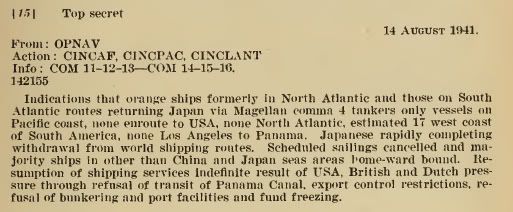
Disclaimer: Opinions posted on Free Republic are those of the individual posters and do not necessarily represent the opinion of Free Republic or its management. All materials posted herein are protected by copyright law and the exemption for fair use of copyrighted works.